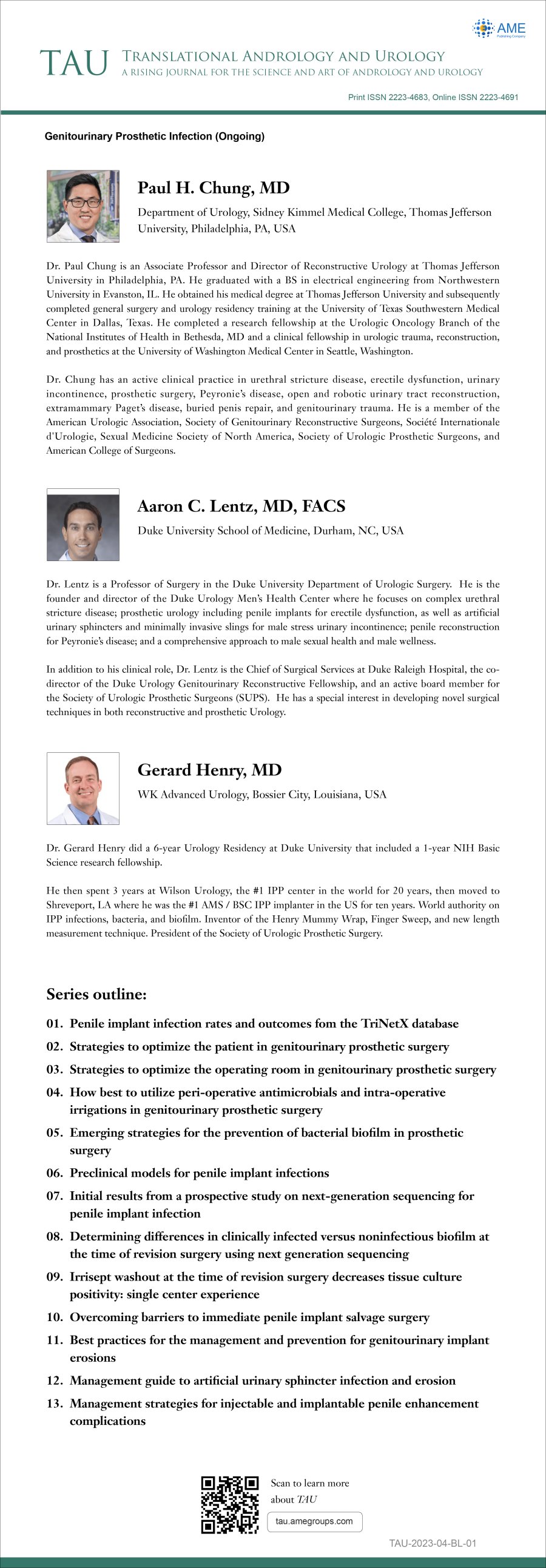
The series on “Genitourinary Prosthetic Infection” is edited by Prof. Paul Chung from Thomas Jefferson University (USA), Prof. Aaron C. Lentz from Duke University (USA), and Prof. Gerard Henry from WK Advanced Urology (USA).
Paul H. Chung, MD
Department of Urology, Sidney Kimmel Medical College, Thomas Jefferson University, Philadelphia, PA, USA
Dr. Paul Chung is an Associate Professor and Director of Reconstructive Urology at Thomas Jefferson University in Philadelphia, PA. He graduated with a BS in electrical engineering from Northwestern University in Evanston, IL. He obtained his medical degree at Thomas Jefferson University and subsequently completed general surgery and urology residency training at the University of Texas Southwestern Medical Center in Dallas, Texas. He completed a research fellowship at the Urologic Oncology Branch of the National Institutes of Health in Bethesda, MD and a clinical fellowship in urologic trauma, reconstruction, and prosthetics at the University of Washington Medical Center in Seattle, Washington.
Dr. Chung has an active clinical practice in urethral stricture disease, erectile dysfunction, urinary incontinence, prosthetic surgery, Peyronie’s disease, open and robotic urinary tract reconstruction, extramammary Paget’s disease, buried penis repair, and genitourinary trauma. He is a member of the American Urologic Association, Society of Genitourinary Reconstructive Surgeons, Société Internationale d'Urologie, Sexual Medicine Society of North America, Society of Urologic Prosthetic Surgeons, and American College of Surgeons.
Aaron C. Lentz, MD, FACS
Duke University School of Medicine, Durham, NC, USA
Dr. Lentz is a Professor of Surgery in the Duke University Department of Urologic Surgery. He is the founder and director of the Duke Urology Men’s Health Center where he focuses on complex urethral stricture disease; prosthetic urology including penile implants for erectile dysfunction, as well as artificial urinary sphincters and minimally invasive slings for male stress urinary incontinence; penile reconstruction for Peyronie’s disease; and a comprehensive approach to male sexual health and male wellness.
In addition to his clinical role, Dr. Lentz is the Chief of Surgical Services at Duke Raleigh Hospital, the co-director of the Duke Urology Genitourinary Reconstructive Fellowship, and an active board member for the Society of Urologic Prosthetic Surgeons (SUPS). He has a special interest in developing novel surgical techniques in both reconstructive and prosthetic Urology.
Gerard Henry, MD
WK Advanced Urology, Bossier City, Louisiana, USA.
Dr. Gerard Henry did a 6-year Urology Residency at Duke University that included a 1-year NIH Basic Science research fellowship.
He then spent 3 years at Wilson Urology, the #1 IPP center in the world for 20 years, then moved to Shreveport, LA where he was the #1 AMS / BSC IPP implanter in the US for ten years. World authority on IPP infections, bacteria, and biofilm. Inventor of the Henry Mummy Wrap, Finger Sweep, and new length measurement technique. President of the Society of Urologic Prosthetic Surgery.
Series outline:
- Penile implant infection rates and outcomes fom the TriNetX database
- Strategies to optimize the patient in genitourinary prosthetic surgery
- Strategies to optimize the operating room in genitourinary prosthetic surgery
- How best to utilize peri-operative antimicrobials and intra-operative irrigations in genitourinary prosthetic surgery
- Emerging strategies for the prevention of bacterial biofilm in prosthetic surgery
- Preclinical models for penile implant infections
- Initial results from a prospective study on next-generation sequencing for penile implant infection
- Determining differences in clinically infected versus noninfectious biofilm at the time of revision surgery using next generation sequencing
- Irrisept washout at the time of revision surgery decreases tissue culture positivity: single center experience
- Overcoming barriers to immediate penile implant salvage surgery
- Best practices for the management and prevention for genitourinary implant erosions
- Management guide to artificial urinary sphincter infection and erosion
- Management strategies for injectable and implantable penile enhancement complications
Disclosure:
The special series “Genitourinary Prosthetic Infection” was commissioned by the editorial office, Translational Andrology and Urology without any funding or sponsorship. Paul Chung, Aaron Lentz, and Gerard Henry are serving as unpaid Guest Editors for the special series.
